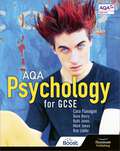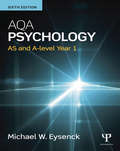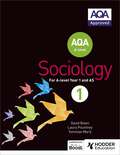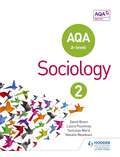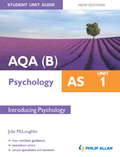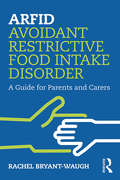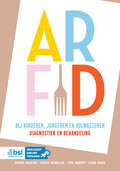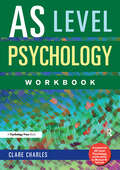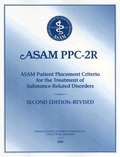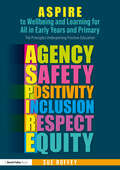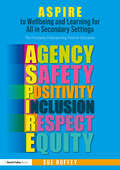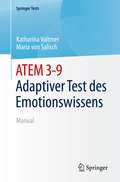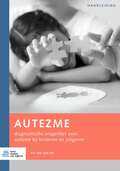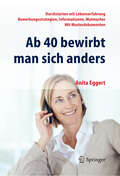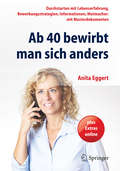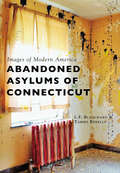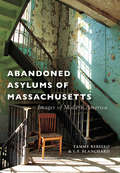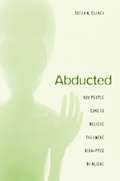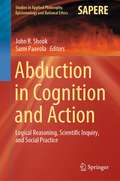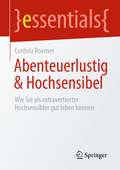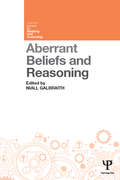- Table View
- List View
AQA Psychology for GCSE: Student Book
by Cara Flanagan Dave Berry Rob Liddle Mark Jones Ruth JonesWritten by renowned author Cara Flanagan and a highly experienced author team, this Student Book has been approved by AQA, offering high quality support you can trust. // Each topic in the specification is presented on one spread so you can see the whole topic with just the right amount of detail and depth of information. // Spreads are divided into Description (AO1) and Evaluation (AO3) - the two key skills for any topic. // Research methods and mathematical requirements are thoroughly covered in a dedicated chapter plus in 'Apply it' exercises across the book. // Application questions, practice questions and skills guidance are provided for the new assessment objectives and mark schemes. // Each chapter ends with visual summaries, example student answers with comments and test yourself multiple choice questions.
AQA Psychology for GCSE: Student Book
by Cara Flanagan Dave Berry Rob Liddle Mark Jones Ruth JonesWritten by renowned author Cara Flanagan and a highly experienced author team, this Student Book has been approved by AQA, offering high quality support you can trust. // Each topic in the specification is presented on one spread so you can see the whole topic with just the right amount of detail and depth of information. // Spreads are divided into Description (AO1) and Evaluation (AO3) - the two key skills for any topic. // Research methods and mathematical requirements are thoroughly covered in a dedicated chapter plus in 'Apply it' exercises across the book. // Application questions, practice questions and skills guidance are provided for the new assessment objectives and mark schemes. // Each chapter ends with visual summaries, example student answers with comments and test yourself multiple choice questions.
AQA Psychology: AS and A-level Year 1
by Michael EysenckAQA Psychology for AS and A-level Year 1 is the definitive textbook for the new 2015 curriculum. Written by eminent psychologist Professor Michael Eysenck, in collaboration with a team of experienced A-level teachers and examiner, the book enables students not only to pass their exams with flying colours, but also to fully engage with the science of psychology. As well as covering the six core topics students will study, the book includes: Activities which test concepts or hypothesises, bringing theory to life. Key research studies explained and explored, showing the basis on which theory has developed Case studies which show how people's lives are affected by psychological phenomena Evaluation boxes which critically appraise key concepts and theories Self-assessment questions which encourage students to reflect on what they've learnt Section summaries to support the understanding of specific ideas - perfect for revision Exam hints which steer students towards complete and balanced answers Key terms defined throughout so students aren't confused by new language 200 figures, tables and photos End of chapter further reading to enable students to develop a deeper understanding End of chapter revision questions and sample exam papers to consolidate knowledge and practice exam technique A full companion website with a range of further resources for both students and teachers, including revision aids and class materials Incorporating greater coverage of research methods, as well as key statistical techniques, the sixth edition of this well-loved textbook continues to be the perfect introduction to psychology. Accessible yet rigorous, the book is the ideal textbook for students taking either the AS course or year 1 of the A-level.
AQA Sociology for A-level Book 1
by David Bown Laura Pountney Tomislav MaricExam Board: AQALevel: AS/A-levelSubject: SociologyFirst Teaching: September 2015First Exam: June 2016Build students' understanding with this concept-driven approach to the 2015 AQA A-level Sociology specification, written by a team of leading subject authors and approved by AQA.- Develop the knowledge required to master Year 1 topics with clear and accessible content coverage- Build confidence in the evaluative skills needed to assess sociological theories and research- Strengthen learning and revision with a wealth of practice and extension questions and activities
AQA Sociology for A-level Book 1 (AQA A-Level #1)
by David Bown Laura Pountney Tomislav MaricExam Board: AQALevel: AS/A-levelSubject: SociologyFirst Teaching: September 2015First Exam: June 2016Build students' understanding with this concept-driven approach to the 2015 AQA A-level Sociology specification, written by a team of leading subject authors and approved by AQA.- Develop the knowledge required to master Year 1 topics with clear and accessible content coverage- Build confidence in the evaluative skills needed to assess sociological theories and research- Strengthen learning and revision with a wealth of practice and extension questions and activities
AQA Sociology for A-level Book 2
by David Bown Laura Pountney Tomislav Maric Natalie MeadowsExam Board: AQALevel: AS/A-levelSubject: SociologyFirst Teaching: September 2016First Exam: June 2017Build students' understanding with this concept-driven approach to the 2015 AQA A-level Sociology specification, written by a team of leading subject authors and approved by AQA.- Develop the knowledge required to master Year 2 topics with clear and accessible content coverage- Build confidence in the evaluative skills needed to assess sociological theories and research- Strengthen learning and revision with a wealth of practice and extension questions and activities
AQA Sociology for A-level Book 2
by David Bown Laura Pountney Tomislav Maric Natalie MeadowsExam Board: AQALevel: AS/A-levelSubject: SociologyFirst Teaching: September 2016First Exam: June 2017Build students' understanding with this concept-driven approach to the 2015 AQA A-level Sociology specification, written by a team of leading subject authors and approved by AQA.- Develop the knowledge required to master Year 2 topics with clear and accessible content coverage- Build confidence in the evaluative skills needed to assess sociological theories and research- Strengthen learning and revision with a wealth of practice and extension questions and activities
AQA(B) AS Psychology Student Unit Guide New Edition: Unit 1 Introducing Psychology
by Julie McLoughlinWritten by a senior examiner, Julie McLoughlin, this AQA(B) AS Psychology Student Unit Guide is the essential study companion for Unit 1: Introducing Psychology.This full-colour book includes all you need to know to prepare for your unit exam: clear guidance on the content of the unit, with topic summaries, knowledge check questions and a quick-reference index examiner's advice throughout, so you will know what to expect in the exam and will be able to demonstrate the skills required exam-style questions, with graded student responses, so you can see clearly what is required to get a better grade
ARFID Avoidant Restrictive Food Intake Disorder: A Guide for Parents and Carers
by Rachel Bryant-WaughARFID Avoidant Restrictive Food Intake Disorder: A Guide for Parents and Carers is an accessible summary of a relatively recent diagnostic term. People with ARFID may show little interest in eating, eat only a very limited range of foods or may be terrified something might happen to them if they eat, such as choking or being sick. Because it has been poorly recognised and poorly understood it can be difficult to access appropriate help and difficult to know how best to manage at home. This book covers common questions encountered by parents or carers whose child has been given a diagnosis of ARFID or who have concerns about their child. Written in simple, accessible language and illustrated with examples throughout, this book answers common questions using the most up-to-date clinical knowledge and research. Primarily written for parents and carers of young people, ARFID Avoidant Restrictive Food Intake Disorder includes a wealth of practical tips and suggested strategies to equip parents and carers with the means to take positive steps towards dealing with the problems ARFID presents. It will also be relevant for family members, partners or carers of older individuals, as well as professionals seeking a useful text, which captures the full range of ARFID presentations and sets out positive management advice.
ARFID bij kinderen, jongeren en volwassenen: Diagnostiek en behandeling
by Sandra Mulkens Renate Neimeijer Eric Dumont Diana KroesDit boek biedt behandelaren in de GGZ praktische handvatten voor de diagnostiek en behandeling van cliënten met een vermijdende/restrictieve voedselinnamestoornis (ARFID). ARFID bij kinderen, jongeren en volwassenen - Diagnostiek en behandeling leidt behandelaren stap voor stap door het diagnostiek- en behandelproces. Het geeft adviezen om effectief te werken met kinderen, jongeren en volwassenen die lijden aan dit ernstige eetprobleem. Het boek combineert actuele wetenschappelijke inzichten met praktijkvoorbeelden en beschrijvingen van de verschillende verschijningsvormen van ARFID. Daardoor herkent de behandelaar dit eetprobleem gemakkelijker en is zo goed toegerust om de therapie aan te gaan. Het boek geeft een helder overzicht van diagnostische instrumenten, materialen voor de behandeling. Daarnaast is een aantal in het Nederlands vertaalde vragenlijsten op het gebied van ARFID in het boek opgenomen. De auteurs van het boek zijn Sandra Mulkens, Renate Neimeijer, Eric Dumont en Diana Kroes. Zij zijn autoriteit op de verschillende gebieden van ARFID en hebben jarenlange ervaring met de doelgroep.
AS Level Psychology Workbook
by Clare CharlesAS Level Psychology Workbook includes structured worksheets for students to fill in as they progress through their AS psychology course. The resulting notes are aimed to provide a useful resource bank for revision purposes. In addition to outlining a structure for note-taking, the workbook also gives supported guidance on everything students need to know in order to do well in the exams. The content is directly relevant to the AQA Specification A and can be used in conjunction with any AS psychology textbook. To integrate with the rest of the learning materials in the Psychology Press A-Level Programme, cross-references are provided throughout to the appropriate pages in Eysenck’s AS Level Psychology, and Brody and Dwyer’s Revise AS Level Psychology. AS Level Psychology Workbook includes the following features: Learning objectives that condense the vast amount of specification content into focused and manageable chunks for each topic Structured worksheets that map on to each of the learning objectives and consist of cues for note-taking, opportunities to fill in the blanks, and activities to enrich learning “Using this in the exam” sections that consider possible exam questions, along with guidance on how to answer them. This workbook will be invaluable for all students tackling AS psychology. It enables them to navigate through the wealth of material linked to the subject, and encourages active learning to promote enjoyment of study. The AS workbook has been fully revised for the new specification for teaching from September 2008.
ASAM PPC-2R: ASAM Patient Placement Criteria For The Treatment Of Substance-related Disorders
by David Mee-Lee American Society of Addiction Medicine Staff Gerald D. Shulman Marc Fishman David R. Gastfriend Julia Harris GriffithThe American Society of Addiction Medicine Patient Placement Criteria 2R (ASAM PPC-2R) is the most widely used and comprehensive set of guidelines for placement, continued stay and discharge of patients with addiction disorders. The ASAM PPC-2R is officially required in over 30 states and provides the addiction field with the nomenclature for describing the continuum of addiction services. The language is consistent with the American Psychiatric Associations Diagnostic and Statistical Manual of Mental Disorders (DSM-IV). <P><P> The second revised edition has been updated to better meet the needs of patients with co-occurring mental and substance-related disorders ("dual diagnosis"). <P> The ASAM Patient Placement Criteria 2R gives medical professionals seeking assistance in providing timely, appropriate, and effective care a holistic and multidimensional approach that matches patient needs to specific treatment services.
ASPIRE to Wellbeing and Learning for All in Early Years and Primary: The Principles Underpinning Positive Education
by Sue RoffeyThis truly accessible resource shows primary school practitioners how to help every student feel valued and included in school so that they develop confidence, resilience, love of learning, a positive sense of self and healthy relationships.Sue Roffey presents a visionary and unique approach to education underpinned by clear principles that can be practically applied in all settings. It is aligned with healthy child development, and addresses what all children need if they are to learn and thrive, including those who experience difficulties and disadvantages. She envisages an education system fit for purpose where all pupils can thrive and make progress in learning, where wellbeing for everyone is at the heart of every school. She uses ASPIRE as an acronym for Agency, Safety, Positivity, Inclusion, Respect and Equity. These principles, when threaded through everything that happens in a school, can genuinely enhance both wellbeing and learning. This resource features a chapter for each principle which explores what this means, why it matters and how it can be applied in early years, primary classrooms and across primary schools. Although visionary, the book is based on both substantial evidence and good practice, with each chapter supported by case studies from across the world.The book demonstrates the positive difference each principle makes to children in primary school settings as well as teachers, parents and the overall community. It is a must-read for primary school teachers, tutors, school leaders, psychologists, parents and anyone who wants an education system that is inclusive, holistic and effective for all students.
ASPIRE to Wellbeing and Learning for All in Secondary Settings: The Principles Underpinning Positive Education
by Sue RoffeyThis truly accessible resource shows secondary school practitioners how to help make every child and young person feel like they really matter when they are in school, so they can develop confidence, resilience, love of learning, a positive sense of self and healthy relationships. Sue Roffey shows how to create a learning environment where all pupils can thrive and make progress in learning, and where wellbeing for everyone is at the heart of every school. By using the unique evidence-based ASPIRE principles of Agency, Safety, Positivity, Inclusion, Respect and Equity in practice, this insightful book shows teachers how to redress the balance in ways that maximise a love for learning, build a positive sense of self, construct healthy relationships, foster resilience and help young people make good choices. This resource features a chapter for each principle which explores what this means, why it matters and how it can be applied across secondary schools. Although visionary, the book is based on both substantial evidence and good practice, with each chapter supported by case-studies across the world. The book demonstrates the positive difference each principle makes to children in secondary school settings as well as teachers, parents and the overall community. It is a must-read for secondary school teachers, tutors, school leaders, psychologists, parents and anyone who wants an education system that is inclusive, holistic and effective for all students.
ATEM 3-9 Adaptiver Test des Emotionswissens: Manual (SpringerTests)
by Katharina Voltmer Maria von SalischSeit den ersten Tagen ihres Lebens erleben Kinder Emotionen: ihre eigenen und die ihrer eng vertrauten Mitmenschen. Das Wissen über die Emotionen anderer Menschen ist ein grundlegender Bestandteil in allen Modellen der emotionalen Kompetenz und eine wichtige Informationsquelle ist dabei, Emotionen in den Gesichtern anderer Menschen zu lesen. Zum Emotionswissen gehört auch das Erkennen externaler und internaler Gründe für das Erleben von Gefühlen, welche Konsequenzen dies hat und außerdem das Wissen über die verschiedenen Möglichkeiten der Emotionsregulation. Die Entwicklung des Emotionswissens schreitet in den Vor- und Grundschuljahren rasant voran. Meta-Analysen zeigen, dass ein gut ausgebildetes Emotionswissen sowohl mit größeren sozialen Kompetenzen, höherer Peerakzeptanz und weniger internalisierendem und externalisierendem Problemverhalten zusammenhängt, als auch mit besseren schulischen Leistungen und positiverer Einstellung zur Schule. Eine valide Erfassung des Emotionswissen stellt die Weichen für gezielte Förderung und Interventionen im vorschulischen und schulischen Bereich.Der ATEM 3-9 ist ein Test des Emotionswissens für Kinder im Alter zwischen drei und neun Jahren. Der ATEM ist nach der Item-Response-Theorie aufgebaut und hat ein adaptives Design. Er umfasst sechs Komponenten: (1) das Erkennen von Emotionen in der Mimik anderer Menschen, (2) das Erkennen von Situationen als Emotionsauslösern, (3) das (Nicht-) Erfüllen von Wünschen als Emotionsauslöser, (4) gemischte Emotionen, (5) Überzeugungen als Emotionsauslöser, (6) Wissen über Ausdrucksregeln von Emotionen und (7) Wissen über Emotionsregulationsstrategien. In diesen Komponenten wird das Emotionswissen über die Emotionen Freude, Trauer, Ärger, Angst, Ekel und Überraschung abgefragt. Die Items des Tests sind in eine für Kinder ansprechend gestaltete Geschichte eingebettet und steigen in ihrer Schwierigkeit entsprechende der Entwicklung des Emotionswissens im Vor- und Grundschulalter an.
AUTEZME handleiding: diagnostische vragenlijst voor autisme bij kinderen en jongeren
by Evi van der ZeeDe AUT-EZ-ME helpt om autisme nauwkeurig te diagnosticeren bij kinderen en jongeren (4 t/m 8 jaar). De test onderscheidt kinderen en jongeren met autisme van kinderen en jongeren met een andere stoornis, of zonder stoornis. De AUT-EZ-ME wordt ingevuld door ouders, verzorgers en leerkrachten van het kind. De test kan worden ingezet op scholen of in de klinische praktijk. De AUT-EZ-ME meet in 36 vragen de vaardigheden empathiseren en systematiseren bij kinderen van 4 tot 18 jaar. Die vaardigheden zijn van belang voor het kaderen van de gedragskenmerken die horen bij een autisme spectrumstoornis. De behaalde score toont aan ofen in welke mate, het kind deze gedragskenmerken vertoont. De vragenlijst is theoretisch zeer goed onderbouwd, en gaat uit van de E-S-theorie van Baron-Cohen.
Aapka Banti: आपका बंटी
by Mannu Bhandari'आपका बंटी' एक कालजयी उपन्यास है। इसे हिंदी साहित्य की एक मूल्यवान उपलब्धि के रूप में देखा जाता है। इस उपन्यास की खासियत यह है कि यह एक बच्चे की निगाहों से घायल होती संवेदना का बेहद मार्मिक चित्रण करता है, जिसमें मध्यमवर्गीय परिवार में संबंध विच्छेद की स्थिति एक बच्चे की दुनिया का भयावह दुःस्वप्न बन जाती है। सभी एक-दूसरे में ऐसे उलझे हैं कि पारिवारिक त्रासदी से उपजी स्थितियां सभी के लिए यातना बन जाती हैं। कहना मुश्किल है कि यह कहानी बालक बंटी की है या माँ शकुन की। शकुन के जीवन का सत्य है कि स्त्री की जायज महत्वाकांक्षा और आत्मनिर्भरता पुरुष के लिए चुनौती है- नतीजे में दाम्पत्य तनाव से उसे अलगाव तक ला छोड़ता है। यह शकुन का नहीं, समाज में निरन्तर अपनी जगह बनाती, फैलाती और अपना कद बढ़ाती 'नई स्त्री' का सत्य है। पति-पत्नी के इस द्वन्द में यहाँ भी वही सबसे अधिक पीसा जाता है, जो नितान्त निर्दोष, निरीह और असुरक्षित है- और वह है बंटी। बच्चे की चेतना में बड़ों के इस संसार को कथाकार मन्नू भंडारी ने पहली बार पहचाना था। बाल मनोविज्ञान की गहरी समझ-बूझ के लिए चर्चित, प्रशंसित इस उपन्यास का हर पृष्ठ ही मर्मस्पर्शी और विचारोत्तेजक है।
Ab 40 bewirbt man sich anders. Durchstarten mit Lebenserfahrung - Bewerbungsstrategien, Informationen, Mutmacher - mit Musterdokumenten: Durchstarten Mit Lebenserfahrung  Bewerbungsstrategien, Informationen, Mutmacher  Mit Musterdokumenten
by Anita EggertAnlässe für Menschen ab 40, sich neu zu bewerben, gibt es viele: Eine Stellenanzeige reizt zu einem beruflichen Neustart, nach einer Erziehungspause steht der Wiedereinstieg an o. ä. Das Buch unterstützt Bewerber, indem es einen systematischen Überblick über alle Phasen gibt: von der Stellensuche über das Telefoninterview bis zum Bewerbungsgespräch. Die Autorin liefert die wichtigsten Tipps für eine zeitgemäße und korrekte Bewerbung sowie Hilfen, um zu einer selbstbewussten inneren Haltung zu finden. Begleitende Website mit Arbeitsmaterialien.
Ab 40 bewirbt man sich anders: Durchstarten mit Lebenserfahrung, Bewerbungsstrategien, Informationen, Mutmacher: mit Musterdokumenten
by Anita EggertEs gibt viele gute Gründe, sich mit ,,über 40" auf dem Arbeitsmarkt zu bewerben! - Doch vieles ist dann nicht mehr so selbstverständlich wie damals nach der Ausbildung und es tauchen Fragen auf: Wo finde ich eigentlich heutzutage Jobs? Wie bewerbe ich mich zeitgemäß? Wie bringe ich einen roten Faden in meinen Lebenslauf? Wie vermittele ich einen professionellen Eindruck? Anita Eggert begleitet Sie im Bewerbungsprozess und hilft Ihnen, eine selbstbewusste Einstellung zu entwickeln, Ihr Profil zu schärfen und einen erfolgreichen Schlachtplan zu entwickeln. Ihr Buch gibt Tipps für alle Phasen der Bewerbung, von der Stellensuche über das Telefoninterview bis zum Bewerbungsgespräch, liefert Fakten für eine individuelle, zeitgemäße und korrekte Bewerbung und Hilfen für ein überzeugendes Auftreten. - NEU in der 2. Auflage sind Infos zu Arbeitgeber-Bewertungsportalen im Internet, dem richtigen Outfit in Vorstellungsgesprächen sowie neuen Smartphone-Apps. Auf der begleitenden Website www. ab-40-bewirbt-man-sich-anders. de finden Sie stets aktuelle Infos und praktische Arbeitsmaterialien (Lebensläufe, Checklisten und ganze neu: Motivationsanschreiben etc).
Abandoned Asylums of Connecticut (Images of Modern America)
by L. F. Blanchard Tammy RebelloThis collection of photographs, history, and firsthand accounts gives readers a glimpse at the roots of mental health. These vignettes are born of the personal stories of those who worked at these facilities, those who were institutionalized, and their families. The authors took the time to listen to their stories and endeavored to understand their past and recognize how these events continue to influence the mental health industry today. Pictured throughout are the physical relics of the places--the now largely abandoned asylums of Connecticut--where these stories unfurled.
Abandoned Asylums of Massachusetts (Images of Modern America)
by L. F. Blanchard Tammy RebelloThis collection of photographs, history, and firsthand accounts gives readers a glimpse at the roots of mental health. These vignettes are born of the personal stories of those who worked at these facilities, those who were institutionalized, and their families. The authors took the time to listen to their stories and endeavored to understand their pasts and recognize how these events continue to influence the mental health industry today. Pictured throughout are the physical relics of the places--the now largely abandoned asylums--where these stories unfurled.
Abducted: How People Come to Believe They Were Kidnapped by Aliens
by Susan A. ClancyThey are tiny. They are tall. They are gray. They are green. They survey our world with enormous glowing eyes. To conduct their shocking experiments, they creep in at night to carry humans off to their spaceships. Yet there is no evidence that they exist at all. So how could anyone believe he or she was abducted by aliens? Or want to believe it? To answer these questions, psychologist Susan Clancy interviewed and evaluated "abductees"--old and young, male and female, religious and agnostic. She listened closely to their stories--how they struggled to explain something strange in their remembered experience, how abduction seemed plausible, and how, having suspected abduction, they began to recollect it, aided by suggestion and hypnosis. Clancy argues that abductees are sane and intelligent people who have unwittingly created vivid false memories from a toxic mix of nightmares, culturally available texts (abduction reports began only after stories of extraterrestrials appeared in films and on TV), and a powerful drive for meaning that science is unable to satisfy. For them, otherworldly terror can become a transforming, even inspiring experience. "Being abducted," writes Clancy, "may be a baptism in the new religion of this millennium." This book is not only a subtle exploration of the workings of memory, but a sensitive inquiry into the nature of belief.
Abduction in Cognition and Action: Logical Reasoning, Scientific Inquiry, and Social Practice (Studies in Applied Philosophy, Epistemology and Rational Ethics #59)
by John R. Shook Sami PaavolaThis book gathers together novel essays on the state-of-the-art research into the logic and practice of abduction. In many ways, abduction has become established and essential to several fields, such as logic, cognitive science, artificial intelligence, philosophy of science, and methodology. In recent years this interest in abduction’s many aspects and functions has accelerated. There are evidently several different interpretations and uses for abduction. Many fundamental questions on abduction remain open. How is abduction manifested in human cognition and intelligence? What kinds or types of abduction can be discerned? What is the role for abduction in inquiry and mathematical discovery? The chapters aim at providing answer to these and other current questions. Their contributors have been at the forefront of discussions on abduction, and offer here their updated approaches to the issues that they consider central to abduction’s contemporary relevance. The book is an essential reading for any scholar or professional keeping up with disciplines impacted by the study of abductive reasoning, and its novel development and applications in various fields.
Abenteuerlustig & Hochsensibel: Wie Sie als extravertierter Hochsensibler gut leben können (essentials)
by Cordula RoemerAgil, gesellig und empfindsam? Hochsensibilität gilt allgemein als eine eher introvertierte Veranlagung. Dennoch gibt es feinfühlige Menschen, die sowohl empfindsam sind und sich zugleich extravertiert durch das Leben bewegen. Wie aber passt dies beides zusammen? Schließen sich die beiden Wesenszüge nicht einander aus? Diesen und weiteren Fragen folgt die Autorin in einem kritischen Diskurs, um mehr Klarheit in den Dschungel unterschiedlicher Zuschreibungen und Erklärungen zu bringen. Dieser Diskurs möchte dazu beitragen, die Gefahr einer möglichen Fehlinterpretation im Rahmen einer fachspezifischen Begleitung in Beratung, Coaching und Therapie bei hochsensiblen Menschen zu verringern. Der zweite Teil des Buches gibt Ihnen umfangreiche und vielfältige Tipps und Methoden zum Umgang mit einer extravertierten Hochsensibilität an die Hand.
Aberrant Beliefs and Reasoning (Current Issues in Thinking and Reasoning)
by Niall GalbraithAn aberrant belief is extreme or unusual in nature. In the most serious cases these beliefs cause emotional distress in those who hold them, and typify the core symptoms of psychological disorders. Each of the chapters in this volume seeks to examine the role that biases in reasoning can play in the formation of aberrant beliefs. The chapters consider several conjectures about the role of reasoning in aberrant belief, including the role of the jumping to conclusion bias in delusional beliefs, the probabilistic bias in paranormal beliefs, the role of danger confirming reasoning in phobias, and the controversial notion that people with schizophrenia do not succumb to specific forms of reasoning bias. There are also chapters evaluating different theoretical perspectives, and suggestions for future research. Aberrant Beliefs and Reasoning is the first volume presenting an overview of contemporary research in this growing subject area. It will be essential reading for academics and students in the fields of human reasoning, cognitive psychology and philosophy, and will also be of great interest to clinicians and psychiatrists.
